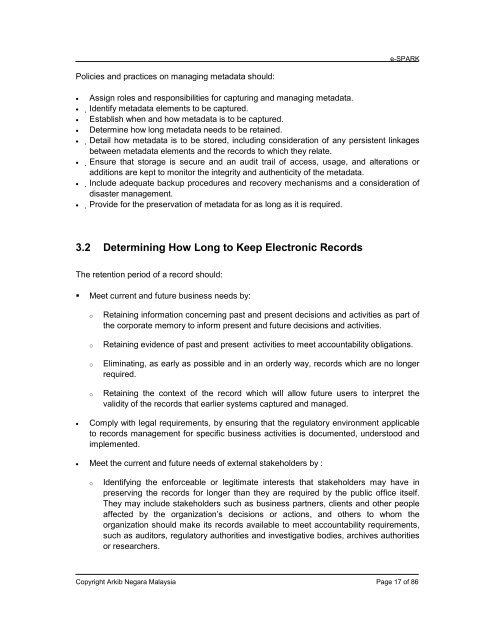Arkib Negara ELECTRONIC RECORDS MANAGEMENT and archive mgmt guideline_eng
You also want an ePaper? Increase the reach of your titles
YUMPU automatically turns print PDFs into web optimized ePapers that Google loves.
e-SPARK<br />
Policies <strong>and</strong> practices on managing metadata should:<br />
• Assign roles <strong>and</strong> responsibilities for capturing <strong>and</strong> managing metadata.<br />
• Identify metadata elements to be captured.<br />
• Establish when <strong>and</strong> how metadata is to be captured.<br />
• Determine how long metadata needs to be retained.<br />
• Detail how metadata is to be stored, including consideration of any persistent linkages<br />
between metadata elements <strong>and</strong> the records to which they relate.<br />
• Ensure that storage is secure <strong>and</strong> an audit trail of access, usage, <strong>and</strong> alterations or<br />
additions are kept to monitor the integrity <strong>and</strong> authenticity of the metadata.<br />
• Include adequate backup procedures <strong>and</strong> recovery mechanisms <strong>and</strong> a consideration of<br />
disaster management.<br />
• Provide for the preservation of metadata for as long as it is required.<br />
3.2 Determining How Long to Keep Electronic Records<br />
The retention period of a record should:<br />
<br />
Meet current <strong>and</strong> future business needs by:<br />
o<br />
o<br />
o<br />
o<br />
Retaining information concerning past <strong>and</strong> present decisions <strong>and</strong> activities as part of<br />
the corporate memory to inform present <strong>and</strong> future decisions <strong>and</strong> activities.<br />
Retaining evidence of past <strong>and</strong> present activities to meet accountability obligations.<br />
Eliminating, as early as possible <strong>and</strong> in an orderly way, records which are no longer<br />
required.<br />
Retaining the context of the record which will allow future users to interpret the<br />
validity of the records that earlier systems captured <strong>and</strong> managed.<br />
• Comply with legal requirements, by ensuring that the regulatory environment applicable<br />
to records management for specific business activities is documented, understood <strong>and</strong><br />
implemented.<br />
• Meet the current <strong>and</strong> future needs of external stakeholders by :<br />
o<br />
Identifying the enforceable or legitimate interests that stakeholders may have in<br />
preserving the records for longer than they are required by the public office itself.<br />
They may include stakeholders such as business partners, clients <strong>and</strong> other people<br />
affected by the organization’s decisions or actions, <strong>and</strong> others to whom the<br />
organization should make its records available to meet accountability requirements,<br />
such as auditors, regulatory authorities <strong>and</strong> investigative bodies, <strong>archive</strong>s authorities<br />
or researchers.<br />
Copyright <strong>Arkib</strong> <strong>Negara</strong> Malaysia Page 17 of 86


